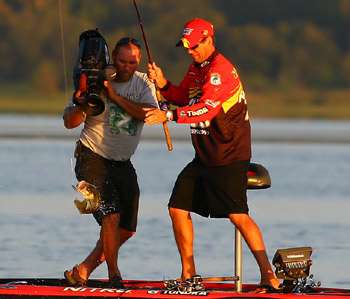
Part 1: Practice | Part 2: 1-Day Tournaments
Fishing a multiday tournament is a different animal. It's not a one-day shootout. You've got to pace yourself but not forget that's it total weight that counts.
VanDam has developed a set of principles for these events. They've helped him win two Bassmaster Classics, four Toyota Tundra Bassmaster Angler of the Year titles and over three million dollars in prize money.
But the principles aren't isolated and do not stand alone. They integrate with his theories on practice and one-day events. They are a mosaic of parts that create a successful whole. After reading "Part 3: Multiday Tournaments," reread all three parts as one piece, the way VanDam intends. That's the best way to appreciate what he has to say about competitive bass fishing.
Part 3: Multiday Tournaments
1. Nutrition, rest, maintenance and weather
"Everything I said in Parts 1 and 2 apply. They are every bit as important in a multiday event, maybe more so.
"You've got to last two, three or four days. Food and rest are critical if you expect to do your best. Some guys may be able to fish one day tired and hungry — although not as well as they think they can — but no one can last four days that way. It can't be done.
"Equipment and maintenance as well as weather are important, too. I suggest you reread those topics in Parts 1 and 2 if you have any doubt about what I'm saying."
2. Practice
"My practice for Elite Events — they're four days long — is fairly basic. We have three days to practice. In a perfect world I spend the first day looking around the lake. I want to know what's there, what's available and maybe what I haven't seen before. I may fish some, but not a lot.
"On day two I try to develop my primary pattern. I try to find enough spots to last the whole event, and then maybe a couple of extras in case I get competition on them from other competitors or recreational anglers.
"The last day I try to develop patterns I don't think I'll need. It's a safety measure in my mind. For instance, if I'm catching bass deep on crankbaits I might try to develop a topwater pattern or maybe a jig or drop shot pattern. This is my insurance policy. If the weather changes unexpectedly or something else goes haywire, I have a fallback position.
"Note, however, that I say 'perfect world' as I discuss this routine. Things aren't always perfect. I may have to spend extra time looking around. Or, maybe I have difficulty developing a primary pattern. Then I spend the third day working on that and hope for the best. If my practice is shorter or longer than three days, I adjust my time accordingly.
"Practice is a matter of strategy and time management. If possible, after practice you should know the water, have a go-to pattern, and a backup pattern. Be prepared for the expected and the unexpected."
3. Manage your fish
"This one can be tough. In practice you need to find bass, but don't get carried away with fishing a spot too long. Find it and get away from it. Save the details for competition days.
"When competition arrives you've got to manage your spots for maximum weight. If you're on a spot that's holding 2-pounders — and nothing bigger — don't fish it too long. Take your limit every day and get away from it.
"But if it's a feeding spot and bigger fish are likely to move in, you need to catch them — now. Remember, tournaments are total weight. A heavy bag on the first day is as good as a heavy bag on the last day.
"You also need to watch for the other competitors and the spectators. If your spots become public you may not have to worry about coming back. In that case you can fish them any way you want. But don't forget that you'll need enough places to fish to last the entire tournament. Don't run yourself short — and you won't if you practiced correctly."
4. Keep a positive mental attitude
"I've ended every part of this series with this thought: No such thing as bad luck and no such thing as a slump; every cast is a new opportunity. Need I say anything else?"
Part 1: Practice | Part 2: 1-Day Tournaments




